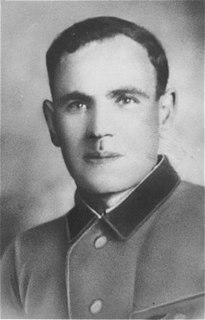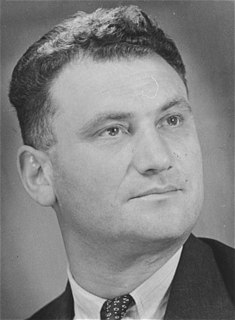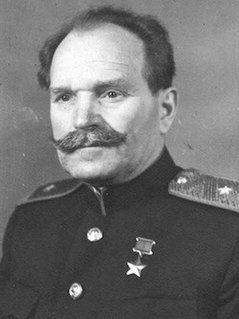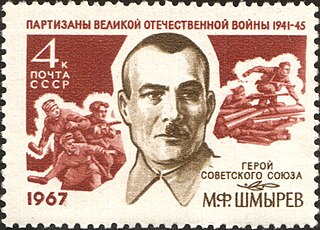 W
WThe Belarusian resistance during World War II opposed Nazi Germany from 1941 until 1944. Belarus was one of the Soviet republics occupied during Operation Barbarossa. The term Belarusian partisans may refer to Soviet-formed irregular military groups fighting Germany, but has also been used to refer to the disparate independent groups who also fought as guerrillas at the time, including Jewish groups, Polish groups, and nationalist Belarusian forces opposed to Germany.
 W
WPyotr Andreievitch Abrassimov was a Soviet war hero and politician who became a career diplomat. He served his country as ambassador successively in China, France, Poland and East Germany.
 W
WAleksandr (Ales) Mikhailovich Adamovich was a Belarusian Soviet writer and a critic, Professor and Corresponding Member of the Academy of Sciences of Belarus, Doctor of Philosophy in philology, Doctorate in 1962 ; member of the Supreme Soviet (1989–92). He wrote in Russian and Belarusian.
 W
WYitzhak Arad was an Israeli historian, author, IDF brigadier general and Soviet partisan. He also served as Yad Vashem's director from 1972 to 1993, and specialised in the history of the Holocaust.
 W
WThe Bielski partisans were a unit of Jewish partisans who rescued Jews from extermination and fought the German occupiers and their collaborators around Nowogródek (Navahrudak) and Lida in German-occupied Poland. The partisan unit was named after the Bielskis, a family of Polish Jews who organized and led the community.
 W
WAlexander Zeisal "Zus" Bielski was a leader of the Bielski partisans who rescued approximately 1,200 Jews from Nazi execution in Belarus during World War II.
 W
WTuvia Bielski was a Belarusian Jewish militant who was leader of the Bielski group, a group of Jewish partisans who set up refugee camps for Jews fleeing the Holocaust during World War II. Their camp was situated in the Naliboki forest, which was part of Poland between World War I and World War II, and which is now in western Belarus.
 W
WAleksey Nikolayevich Botyan was a Soviet and Russian spy and intelligence officer. He was awarded the title of Hero of the Russian Federation in 2007 for his role in protecting the Polish city of Kraków from destruction by the Nazis in January 1945.
 W
WMaria "Masha" Bruskina was a Belarusian Jewish nurse and a member of the Minsk Resistance during World War II. While volunteering as a nurse, she cared for Soviet forces, and assisted them in escaping. For this, she was executed by German forces.
 W
WJanka Bryl was a Soviet and Belarusian writer best known for his short stories. He was one of the older generation of Soviet writers who had begun their literary careers in Stalin's time but received a new lease on life in the late 1950s along with such contemporaries as Ivan Shamiakin and Ivan Melezh.
 W
WVasil Uladzimiravič Bykaŭ was a prolific Soviet and Belarusian author of novels and novellas about World War II and a significant figure in Soviet and Belarusian literature and civic thought. His work earned him endorsements for the Nobel Prize nomination from, among others, Nobel Prize laureates Joseph Brodsky and Czesław Miłosz.
 W
WPeter Florin was an East German politician and diplomat.
 W
WSergey Vladimirovich Grishin was a Colonel in the Soviet Army and Hero of Soviet Union, who served as a partisan during World War II.
 W
WVera Kharuzhaya was a Belarusian Communist writer, school teacher and activist from the Soviet Union deployed to Poland for sabotage and espionage operation during the interbellum. She was executed as a partisan by the Germans during World War II.
 W
WAleksey Yefimovich Kleshchev was a Belarusian general and politician. He served as the Chairman of the Council of Ministers of the Byelorussian Soviet Socialist Republic from 17 March 1948 to 24 July 1953. Kleschchov led partisans in Pinsk as a major general during World War II, for which he was awarded the title Hero of the Soviet Union. He was a member of the Communist Party of Kazakhstan from 1955 until 1960. He was deputy member of the Supreme Soviet of the Soviet Union. From 1927 to 1929, he served in the Red Army. He was born in Minsk Governorate and died in Moscow on 13 December 1968, aged 63. He was decorated as the Order of the Red Banner.
 W
WYelena Fyodorovna Kolesova was the commander of a partisan unit of the Soviet special forces during World War II. After dying in battle in a successful attack on a German fortress in Vydritsa, Kolesova was posthumously awarded the title Hero of the Soviet Union on 21 November 1944.
 W
WMikhail Petrovich Konstantinov was a Soviet Army colonel general and a Hero of the Soviet Union.
 W
WVasily Zakharovich Korzh, also known under the Soviet partisan nom de guerre Komarov, was a Soviet Byelorussian communist activist, partisan, and one of the leaders of the Belarusian resistance during World War II.
 W
WVasil Ivanavich Kazlow was a Soviet politician.
 W
WMichael (Mishe) Lev was a Yiddish language writer from Podolia.
 W
WTatyana Savelyevna Marinenko, was a Soviet partisan and intelligence officer of the NKVD during the Second World War. After she was captured and tortured by the Germans in 1942 she was posthumously declared a Hero of the Soviet Union on 8 May 1965.
 W
WPyotr Mironovich Masherov was a Soviet partisan, statesman, and one of the leaders of the Belarusian resistance during World War II who governed the Byelorussian Soviet Socialist Republic as First Secretary of the Communist Party of Byelorussia from 1965 until his death in 1980. Under Masherov's rule, Belarus went from an agrarian, undeveloped nation which had not yet recovered from the Second World War into an industrial powerhouse; Minsk, the capital and largest city of Belarus, became one of the fastest-growing cities on the planet. Masherov ruled until his sudden death in 1980, after his vehicle was hit by a potato truck.
 W
WAnna Ivanovna Maslovskaya was a Soviet partisan in the Byelorussian SSR during German occupation in the Second World War. She was awarded the title Hero of the Soviet Union on 15 August 1945 by decree of the Supreme Soviet for her resistance activities.
 W
WYelena Grigorievna Mazanik was the Soviet partisan responsible for the assassination of General-Kommissar of Nazi-occupied Belarus Wilhelm Kube by placing a small timebomb under his bed while working for him as a housemaid. For assassinating him she and her co-conspirators were awarded the title Hero of the Soviet Union on 29 October 1943 by decree of the Supreme Soviet.
 W
WKirill Trofimovich Mazurov was a Soviet Byelorussian partisan, politician, and one of the leaders of the Belarusian resistance during World War II who governed the Byelorussian Soviet Socialist Republic as First Secretary of the Communist Party of Byelorussia from 1956 until 1965, when he became a member of the Politburo of the CPSU.
 W
WMarytė or Marija Melnikaitė was a Soviet partisan and the only Lithuanian woman awarded Hero of the Soviet Union. While her partisan career lasted less than two months, Soviet propaganda exaggerated her duties and accomplishments. Many works, including a film and an opera, were dedicated to her. Several streets in the former Soviet Union are still named after her.
 W
WBoris Nesterenko was a member of the USSR Union of Artists, a participant of many art exhibitions and some foreign auctions. His works are on show in many of the Ukrainian and foreign museums, galleries and private collections.
 W
WKirill Prokofyevich Orlovsky was a Soviet partisan commander, a functionary of the Soviet secret police (Cheka-GPU-NKVD), and the chairman of a major kolkhoz. He was a recipient of the Hero of the Soviet Union award for courage during fighting the Nazi occupation behind enemy lines.
 W
WMariya Osipova was the Soviet partisan who provided Yelena Mazanik with the bomb she used to kill Wilhelm Kube, a high-ranking SS officer and the General-Kommissar of Nazi-occupied Belarus. For doing so Osipova and her co-conspirators were awarded the title Hero of the Soviet Union on 29 October 1943.
 W
WAlexander 'Sasha' Pechersky was one of the organizers, and the leader, of the most successful uprising and mass-escape of Jews from a Nazi extermination camp during World War II; which occurred at the Sobibor extermination camp on 14 October 1943.
 W
WPanteleimon Kondratyevich Ponomarenko was a Soviet statesman and politician and one of the leaders of Soviet partisan resistance in Belarus. He served as an administrator at various positions within the Soviet government, including the leadership positions in Byelorussian and Kazakh SSRs.
 W
WSiarhei Prytytski was a Belarusian Soviet statesman.
 W
WAlexander Onufrievich Savitsky, also known as Ales Savitsky, was a Belarusian writer and public figure. He was a member of the Writers' Union and the Union of Writers of the BSSR from 1961 to 2015.
 W
WMinay Filippovich Shmyryov, also transliterated as Minay Shmyrev and Minai Shmyrev, was one of the leaders of the Belarusian partisan resistance against the German occupation during World War II.
 W
WNadezhda Viktorovna Troyan was a Soviet intelligence officer who also served as a nurse in a partisan unit. She is most known for her role in the assassination of Wilhelm Kube, for which she and her fellow co-conspirators were honored with the title Hero of the Soviet Union on 29 October 1943.
 W
WGeneral Michał Vituška was a Belarusian leader of the Black Cats, a unit of the SS-Jagdverbände, during World War II.
 W
WYefrosinya Savelyevna Zenkova was the secretary of the underground Komsomol resistance organization nicknamed the "Young Avengers" during the Second World War. She was declared a Hero of the Soviet Union on 1 July 1958 by decree of the Supreme Soviet.